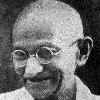

Mohandas K. Gandhi Tags: Mohandas Karamchand Gandhi View |
Mohandas Karamchand Gandhi (lang-hi??????? ?????? ?????, lang-gu??????? ?????? ?????, pronounced IPA-hnsmo???n?d?a?s k?r?m??n?d? ?a?n?d??i?Hi-Mohandas_Karamchand_Gandhi_pronunciation.ogg; 2 October 1869 - 30 January 1948) was the pre-eminent political and spiritual leader of India (British Raj) during the Indian independence movement. He was the pioneer of satyagraha?resistance to tyranny through mass civil disobedience, a philosophy firmly founded upon ahimsa or total nonviolence?which led India to independence and inspired movements for civil rights and freedom across the world. Gandhi is commonly known around the world as Mahatma Gandhi (IPA-hnsm??a?t?ma?; Sanskrit: ??????? mah?tm? (Mahatma) or "Great Soul", an honorific first applied to him by Rabindranath Tagore), and in India also as Bapu (lang-gu????, b?pu or "Father"). He is officially honoured in India as the Father of the Nation; his birthday, 2 October, is commemorated there as Gandhi Jayanti, a national holiday (holidays in India), and worldwide as the International Day of Non-Violence.
Gandhi first employed non-violent civil disobedience while an expatriate lawyer in South Africa, during the resident Indian communitys struggle for civil rights. After his return to India in 1915, he organized protests by peasants, farmers, and urban labourers concerning excessive land-tax and discrimination. After assuming leadership of the Indian National Congress in 1921, Gandhi led nationwide campaigns to ease poverty, expand womens rights, build religious and ethnic amity, end untouchability (dalit), and increase economic self-reliance. Above all, he aimed to achieve Swaraj or the independence of India from foreign domination. Gandhi famously led his followers in the Non-cooperation movement that protested the British-imposed salt tax with the 400 km (240 mi) Dandi Salt March (Salt Satyagraha) in 1930. Later, in 1942, he launched the Quit India (Quit India Movement) civil disobedience movement demanding immediate independence for India. Gandhi spent a number of years in jail in both South Africa and India.
As a practitioner of ahimsa, he swore to speak the truth and advocated that others do the same. Gandhi lived modestly in a self-sufficient residential community (Sabarmati Ashram) and wore the traditional Indian dhoti and shawl, woven with yarn he had hand spun himself. He ate simple vegetarian food, eventually adopting a fruitarian diet, and also undertook long fasts (Fasting) as a means of both self-purification and social protest.
Date of birth: 1869-10-02
Birth Location: Porbandar, Kathiawar Agency, British Raj, British India
Date of death: 1948-01-30
Death Location: New Delhi, Union of India
Death Cause: Assassination (Assassination of Mohandas Karamchand Gandhi)
Resting Place: Rajghat (Raj Ghat and associated memorials), New Delhi, India
Nationality: Indian
Allias Name: Mahatma Gandhi, Bapu
Known For: Prominent Figure of Indian Independence Movement (Indian independence movement),Propounding the philosophy of Satyagraha and Ahimsa
Alma Mater: University College London, University of London
Religion: Hinduism
Spouse: Kasturba Gandhi
Children: Harilal (Harilal Gandhi),Manilal (Manilal Gandhi),Ramdas (Ramdas Gandhi), Devdas (Devdas Gandhi)
Parents: Putlibai Gandhi (Mother),Karamchand Gandhi (Father)

